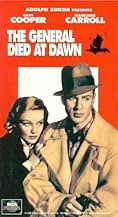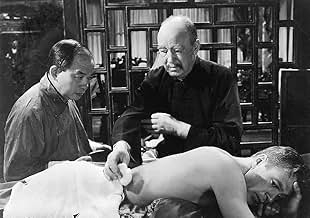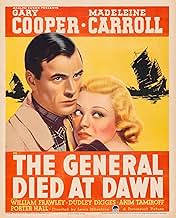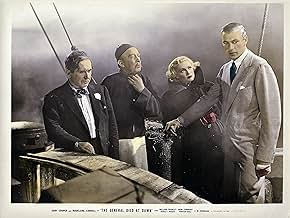IMDb RATING
6.5/10
1.4K
YOUR RATING
Amid the anarchy of China, an American mercenary tangles with a ruthless warlord.Amid the anarchy of China, an American mercenary tangles with a ruthless warlord.Amid the anarchy of China, an American mercenary tangles with a ruthless warlord.
- Nominated for 3 Oscars
- 3 nominations total
Lee Tong Foo
- Mr. Chen
- (as Lee Tung-Foo)
Hans Fuerberg
- Yang's Military Advisor
- (as Hans Furberg)
Irene Bennett
- Passenger
- (uncredited)
Spencer Chan
- Killer
- (uncredited)
Thomas Chan
- Houseboy
- (uncredited)
- Director
- Writers
- All cast & crew
- Production, box office & more at IMDbPro
Storyline
Did you know
- TriviaThe main character, O'Hara, is based on the real-life adventurer Morris "Two-Gun" Cohen (1887-1970). Born in Poland to a Jewish family, Cohen grew up in the tough streets of London's East End. As a teenager, he moved to western Canada and became a ranch hand and gambler in Saskatchewan, and later a highly successful real-estate agent in Alberta. During World War I he fought in Europe with the Canadian Railway Troops. His friendship with Chinese workers on the Canadian-Pacific Railroad prompted him to go to China in the 1920s. After negotiating a railroad deal with Dr. Yat-sen Sun, Cohen became a personal bodyguard to Sun and a trainer of Sun's private army. After Sun's death in 1925, Cohen ran guns for various Chinese warlords throughout the 1930s. When the Japanese invaded China in 1937, Cohen continued to supply Chinese resistance forces with arms and served with the British SOE. In 1941, following the fall of Hong Kong, he was captured by the Japanese and put in a prison camp, but was traded to the English in 1943 in a rare prisoner exchange. After the war, Cohen continued to operate in China as an agent for various British firms, including Rolls-Royce and Decca Radar. His former dealings with Chinese warlords kept him in good standing with Chinese Communist officials until his death in 1970.
- GoofsWhile arguing with Peter, Judy slams a book down on the desk. A couple of other books on the corner of the desk disappear in a later scene.
- Crazy creditsThe opening credits all appear on the sails of boats.
- ConnectionsFeatured in Red Hollywood (1996)
Featured review
Thanks to the cast of characters in here, led by the wise-cracking Gary Cooper and a pretty Madeline Carroll, this was a pretty interesting film. Some of the minor characters also made this movie to fun, notably Akim Tamiroff's "General Yang," as well as Bill Frawley''s "Brighton;" Porter Hall's "Peter Prrie/Peter Martin" and Dudley Digges' creepy busybody "Mr. Wu."
Nowaday, Digges and Tamiroff's characters would be played by real Asian actors and would be a bit more credible. Also, in a real-life situation, Cooper would have been eliminated early on after the bad guys had gotten his money.
Nevertheless, credibility issues aside (which you have to do in most movies, anyway, old and new), the good dialog, interesting faces, characters and cinematography all make this movie a lot better than I expected.
Nowaday, Digges and Tamiroff's characters would be played by real Asian actors and would be a bit more credible. Also, in a real-life situation, Cooper would have been eliminated early on after the bad guys had gotten his money.
Nevertheless, credibility issues aside (which you have to do in most movies, anyway, old and new), the good dialog, interesting faces, characters and cinematography all make this movie a lot better than I expected.
- ccthemovieman-1
- Sep 25, 2006
- Permalink
- How long is The General Died at Dawn?Powered by Alexa
Details
- Runtime1 hour 38 minutes
- Color
- Aspect ratio
- 1.37 : 1
Contribute to this page
Suggest an edit or add missing content

Top Gap
By what name was The General Died at Dawn (1936) officially released in India in English?
Answer



































